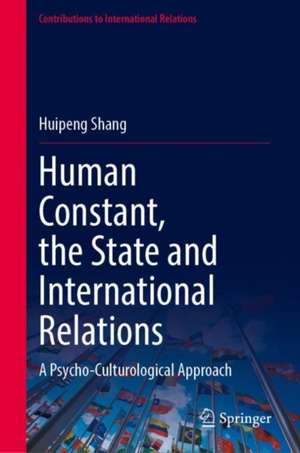People (Jen), State and Inter-state Relations: A Psycho-Culturological Approach: Contributions to International Relations
Autor Huipeng Shangen Limba Engleză Hardback – 18 oct 2023
Din seria Contributions to International Relations
- 17%
 Preț: 525.08 lei
Preț: 525.08 lei - 24%
 Preț: 629.56 lei
Preț: 629.56 lei - 18%
 Preț: 787.29 lei
Preț: 787.29 lei - 18%
 Preț: 725.43 lei
Preț: 725.43 lei - 15%
 Preț: 697.32 lei
Preț: 697.32 lei - 18%
 Preț: 722.75 lei
Preț: 722.75 lei - 15%
 Preț: 650.19 lei
Preț: 650.19 lei - 18%
 Preț: 894.34 lei
Preț: 894.34 lei - 15%
 Preț: 637.78 lei
Preț: 637.78 lei - 18%
 Preț: 721.95 lei
Preț: 721.95 lei - 15%
 Preț: 689.64 lei
Preț: 689.64 lei -
 Preț: 343.98 lei
Preț: 343.98 lei - 18%
 Preț: 775.30 lei
Preț: 775.30 lei - 24%
 Preț: 687.19 lei
Preț: 687.19 lei - 15%
 Preț: 693.90 lei
Preț: 693.90 lei - 18%
 Preț: 896.70 lei
Preț: 896.70 lei - 15%
 Preț: 698.47 lei
Preț: 698.47 lei - 18%
 Preț: 781.15 lei
Preț: 781.15 lei - 18%
 Preț: 719.13 lei
Preț: 719.13 lei - 18%
 Preț: 730.65 lei
Preț: 730.65 lei - 18%
 Preț: 788.22 lei
Preț: 788.22 lei - 18%
 Preț: 777.03 lei
Preț: 777.03 lei - 18%
 Preț: 785.74 lei
Preț: 785.74 lei - 18%
 Preț: 1023.28 lei
Preț: 1023.28 lei - 15%
 Preț: 693.71 lei
Preț: 693.71 lei - 18%
 Preț: 780.82 lei
Preț: 780.82 lei - 18%
 Preț: 721.51 lei
Preț: 721.51 lei - 18%
 Preț: 886.26 lei
Preț: 886.26 lei - 15%
 Preț: 692.09 lei
Preț: 692.09 lei - 18%
 Preț: 792.19 lei
Preț: 792.19 lei - 18%
 Preț: 727.18 lei
Preț: 727.18 lei
Preț: 399.29 lei
Nou
Puncte Express: 599
Preț estimativ în valută:
76.40€ • 79.77$ • 63.23£
76.40€ • 79.77$ • 63.23£
Carte tipărită la comandă
Livrare economică 04-18 aprilie
Preluare comenzi: 021 569.72.76
Specificații
ISBN-13: 9789819961191
ISBN-10: 981996119X
Pagini: 338
Ilustrații: XX, 338 p. 19 illus., 5 illus. in color.
Dimensiuni: 155 x 235 mm
Greutate: 0.68 kg
Ediția:1st ed. 2023
Editura: Springer Nature Singapore
Colecția Springer
Seria Contributions to International Relations
Locul publicării:Singapore, Singapore
ISBN-10: 981996119X
Pagini: 338
Ilustrații: XX, 338 p. 19 illus., 5 illus. in color.
Dimensiuni: 155 x 235 mm
Greutate: 0.68 kg
Ediția:1st ed. 2023
Editura: Springer Nature Singapore
Colecția Springer
Seria Contributions to International Relations
Locul publicării:Singapore, Singapore
Cuprins
Psycho-culturology and International Relations: Perspectives and Paradigms.- Mainstream Theories of International Relations and the Attempt to Create the "Chinese School".- Psycho-culturology: Core Concepts and Perspectives.- Human constant(Jen), the State and International Relations.- From “International Politics” to “International Relations”.- "Lun-jen" and the Outside World.- “Lun-jen” (伦人) and “Fu-guo” (服国).- “Lun-jen” and “Tianxia” (Tributary system).- “Harmony” and Lun-jen's Model of Psycho-Social Homeostasis.- China and the System of Nation-states: Approaches and Dilemmas.- The “Individual Jen” and Contemporary International Order.- The “Individual Jen”, the “Individual State” and the Modern International Order.- Peace and the Evolution of the International System.- The “Ultimately Individual Jen”: Analysis of the American Human Constant and its Psycho-Social Homeostasis.- The Outside World of the “Ultimately Individual Jen”.- “Soft Power”, the “UltimateIndividualism” and Americans’ Human Constant.- State Forms of Japan and India and the International System.- The Japanese Human Constant and Japanese Diplomacy.- Sequence Consciousness and the "Greater East Asia Co-Prosperity Sphere": A Psycho-culturological Interpretation of the Japanese State Behavior during World War II.- Cultural Tradition and the Establishment of Western Political System in India.- The Ancient South Asia’s International System: Features and Principles of the " Dharma System".
Notă biografică
Huipeng Shang, distinguished professor at Huaqiao University (a retired professor of Peking University) where he directs the Institute of Psycho- Culturological Studies. For many years he has been doing research on psycho-culturology, comparative studies of large-scale civilizational societies and theory of international relations. He has published many books, among which are “The Essentials of Psycho-Culturological Studies: Theories and Methods of Comparative Studies of Large-scale Civilizational Societies”, “Caste and Hindu Society” (the winner of the first prize award at the 7th Beijing Outstanding Social Science Works contest), “Decoding the ‘Cultural Genes’ in China and Japan” (Volumes 1 and 2), etc.
Textul de pe ultima copertă
This book explores the relationship between the “human constant” (Jen) of the four large-scale civilizational societies—China, the USA, Japan, and India—and their international behavior, response patterns, and interaction with the international system. The book analyzes the characteristics and limitations of the current international system, as well as the way it is related to the Western type of “human constant”. It also analyzes the challenges facing China in its integration into the international system. This book aims to explore international relations from the combined psychological and cultural perspective. The key concept of this book is “Jen”, which contains a distinct Chinese cultural experience, into the theory of international relations. Unlike other IR books to treat state as the main political actor, the book analyzes both the political aspects of state as an “organizational entity” and its civilizational aspects as a “civilizational entity”; hence, it proposes a newontology of international relations. By integrating the concept of “Jen” based on the unique Chinese cultural experience into the theory of international relations, the book reveals the interactive nature of relationship between the international system and “human constant”. The book explains the causal relationship between state’s behavior and its “human constant”, analyzes the cultural characteristics of state actors and the international system, and tries to provide a new theoretical framework for understanding culture and modernity.
Caracteristici
Introduces the two new paradigms used in psycho-culturology—human constant (Jen) and psycho-social homeostasis Provides an analysis of international relations and the state from its civilizational aspect Discusses how China's unique cultural experience is integrated into the theory of international relations
